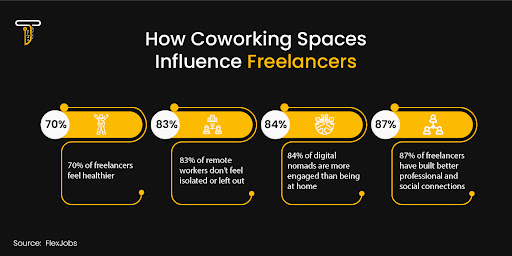Shared Office Spaces – A Solution to all Freelancer Problems
Remote work is far more appealing than corporate office jobs under the supervision of nosy bosses. Freelancers can spend all day in their pajamas or sipping lattes in outdoor cafes. Furthermore, they will never be late for work as they are bosses of their own domains. It’s no surprise that freelancers make up a big portion of the global workforce with 1.57 billion people worldwide.
Despite all the flags that indicate freelancers will take over the business world much sooner, there are several challenges that won’t let that happen. In a couple of months, the “honeymoon phase” of remote workers eventually ends as they enter a vacuum of isolation, regressive personal health, productivity decline, and other formidable shortcomings.
Let’s go through ways coworking spaces help these freelancers improve their quality of life and accelerate business growth.
A Guide to Popularity Gaining Shared Spaces Concept
In its truest sense shared office spaces are the citadel for freelancers, entrepreneurs, and budding start-ups. They have been serving as a breather for remote workers by offering to forgo rental places and perform their tasks freely in adaptable surroundings. For freelancers, reasons to prefer a shared space over their home offices are more than just accepting agile places that offer cost-saving solutions. Ideally, remote workers are more attracted to its advantages such as productivity, innovation, satisfaction, and flexibility.
Remote work is here to stay and coworking spaces will continue to fill in the gaps by offering privacy, equipment, separate rooms, fast internet connectivity, and other amenities. According to the latest findings by Statista, there are around 28,552 shared offices worldwide in 2022 with multiple types to better facilitate freelancers.
Shared Spaces have Multiple Choices for Freelancers
Co-working spaces come in different sizes, spaces, and services. From tech hubs and luxury facilities to ecologically sound pods, freelancers can land anywhere they find more suitable. They can easily find separate rooms and private desks for video conferences. Furthermore, freelancers will face less trouble when changing their workstations for moving to somewhere that best fits their creative needs.
Private Spaces with Individual Ownership
Private shared offices are the places for freelancers that have founded a company, particularly in its early years of development. Remote workers can either own a private room or the complete floor depending on their teams’ needs.
Venture/Incubators or Mentorship Houses
Incubators or venture houses are relatively different from the rest of the other workspaces. They offer mentorship and funding programs for freelancers that ultimately aid in business growth. Moving to one of the incubators can open unexpected ways for remote workers to increase clientele.
Industry-Specific Shared Offices
As the name implies, industry-specific shared spaces are geared toward freelancers who belong to the same business niche. They can either be software developers, music composers, graphic designers, or account executives. While working in industry-specific places, freelancers can get access to advanced equipment and boost morale by connecting with people bearing similar interests.
Open Workplaces with Diverse Community
Open virtual offices still fulfill their promise of traditional coworking ideas because they offer space to every company irrespective of their backgrounds. Freelancers can interact with different business enthusiasts, successful entrepreneurs, and industrial tycoons. This way, remote workers will not be confined to their aura of expertise rather they can polish several more skills.
Top 5 Ways Freelancers can Benefit from Moving into a Coworking Space
With a projection of touching the mark of 41,975 by 2024, undoubtedly coworking spaces are here to stay. Freelancers are no strangers to work and travel but for a couple of years, it was only limited to managing tasks from home. However, with the growing number of coworking spaces, remote workers can now go beyond their living rooms. They can be a part of the wider professional and corporate community.
Read on to know about five reasons why moving to shared office spaces is worth giving a try for freelancers.

Coworking Enhances Skill and Builds Clientele
Shared office spaces enable freelancers to enhance their capabilities. Around 68% of remote workers claim they have picked new skills by connecting to employees with different Job Descriptions (JDs).
Shared offices have an equal share in building a clientele for freelancers. They host professional get-togethers such as mentorship programs, fundraising events, and much more. Furthermore, freelancers can avail of marketing services that spruce up their portfolio for business expansion.
Workspace Designs Break The Wearisome Monotony
While traditional corporate offices overlook much of the employee needs, coworking spaces ensure none of the demands is unfulfilled. Forward-thinking shared spaces replace boring interiors with ergonomic designs, trendy furniture, and the latest in-house facilities.
Freelancers not wanting to choose a cubicle office can freely move to a coworking space with modern aesthetics, versatile seating arrangements, top-notch acoustics, and much more.
Shared Spaces are the Work from Wherever, Whenever Places
Freelancers often turn unconventional spaces into their professional workstations which can either be study rooms or coffee shops. However, these are not permanent stay areas because the tea house might move to some other place. On the contrary, freelancers can execute their innovative workplace ideas by moving to a shared office.
Considering the increase in the number of employees that will need coworking places to five million by 2024, flexible workspace providers are already expanding their network. With their offices almost everywhere, freelancers can continue completing tasks whenever and wherever they want.
Shared Offices Bridge Lonely Freelancers with Alike Coworkers
For freelancers, working from home means that they are on their own. This is where isolation, loneliness, community exclusion, and other diverse effects take over. These consequences ultimately not only affect remote workers’ productivity but also fade their socialization skills.
Coworking Steads Provide Endless Amenities and No-cost Commitments
Flexible and coworking steads have become an ideal go-to professional setting for freelancers from a decade now. Whether they require a year-long lease or temporary desks, shared offices offer several memberships. They also take the infrastructure and amenities management burden so that freelancers can dedicatedly focus on their goals.
Endless amenities such as high-speed internet, secure IPs, conference rooms, 24/7 access, smart TVs, reserved desks, cleanliness, and much more are other benefits of moving to a shared office.
Coworking spaces, in contrast, bridge freelancers with employees having similar or different interests that support them in times of ups and downs. Who knows chit-chat while making coffee in a shared office place can lead to big projects.
How Techub Serves as the Breakthrough for Freelancers?
Freelancers, irrespective of their business niche, are inherently independent but it can influence their ability to compete in the competitive labor market. However, by shifting their workstations to a Techub they can access amenities and opportunities they might never think of. Freelancers won’t be tied to rigid contracts, long-term memberships, and expensive leases in these coworking spaces.
Techub has open doors for everyone with 24-hour access, luxury facilities, and added professional setting for freelancers’ growth.
Tip: A Guide To Office Space in Lahore !!!


